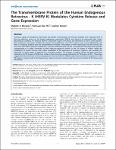The Transmembrane Protein of the Human Endogenous Retrovirus - K (HERV-K) Modulates Cytokine Release and Gene Expression
Morozov, Vladimir
Thi, Viet Loan Dao
Denner, Joachim
Numerous copies of endogenous retroviruses are present in the genome of mammals including man. Although most of them are defective, some, e.g., the human endogenous retroviruses HERV-K, were found to be expressed under certain physiological conditions. For instance, HERV-K is expressed in germ cell tumours and melanomas as well as in the placenta. Most exogenous retroviruses including the human immunodeficiency virus HIV-1 induce severe immunodeficiencies and there is increasing evidence that the transmembrane envelope (TM) proteins of these retroviruses may be involved. We show here that HERV-K particles released from a human teratocarcinoma cell line, a recombinant TM protein and a peptide corresponding to a highly conserved so-called immunosuppressive domain in the TM protein of HERV-K inhibit the proliferation of human immune cells, induce modulation of the expression of numerous cytokines, and modulate the expression of cellular genes as detected by a microarray analysis. The changes in cytokine release and gene expression induced by the TM protein of HERV-K are similar to those found previously induced by the TM protein of HIV-1. These data suggest that the mechanism of immunosuppression may be similar for different retroviruses and that the expression of the TM protein in tumours and in the placenta may suppress immune responses and thus prevent rejection of the tumour and the embryo.
Dateien zu dieser Publikation
Keine Lizenzangabe
Verwandte Publikationen
Anzeige der Publikationen mit ähnlichem Titel, Autor, Urheber und Thema.
-
2013-08-08ZeitschriftenartikelCytomegalovirus Downregulates IRE1 to Repress the Unfolded Protein Response Stahl, Sebastian; Burkhart, Julia M.; Hinte, Florian; Tirosh, Boaz; Mohr, Hermine; Zahedi, René P.; Sickmann, Albert; Ruzsics, Zsolt; Budt, Matthias; Brune, WolframDuring viral infection, a massive demand for viral glycoproteins can overwhelm the capacity of the protein folding and quality control machinery, leading to an accumulation of unfolded proteins in the endoplasmic reticulum ...
-
2012-12-21ZeitschriftenartikelProtein-Protein Interaction Domains of Bacillus subtilis DivIVA Baarle, Suey van; Celik, Ilkay Nazli; Kaval, Karan Gautam; Bramkamp, Marc; Hamoen, Leendert W.; Halbedel, SvenDivIVA proteins are curvature-sensitive membrane binding proteins that recruit other proteins to the poles and the division septum. They consist of a conserved N-terminal lipid binding domain fused to a less conserved ...
-
2013-03-11ZeitschriftenartikelTowards further reduction and replacement of animal bioassays in prion research by cell and protein misfolding cyclic amplification assays Boerner, Susann; Wagenführ, Katja; Daus, Martin L.; Thomzig, Achim; Beekes, MichaelLaboratory animals have long since been used extensively in bioassays for prions in order to quantify, usually in terms of median infective doses [ID50], how infectious these pathogens are in vivo. The identification of ...

